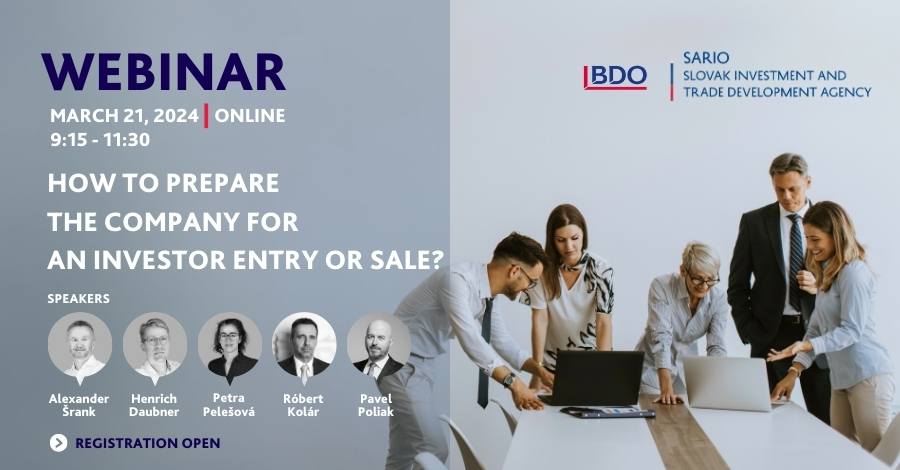Webinar: How to prepare your company for investor entry or sale
Webinar: How to prepare your company for investor entry or sale
In cooperation with the Slovak Investment and Trade Development Agency, we would like to invite you to a free webinar for companies and entrepreneurs who are interested in learning more about the issue of investors entering their company, or who want to get more information about the sale of companies.
Our experts in transaction, tax and legal advisory services, headed by Alexander Šranek, Henrich Daubner, Róbert Kolar and Pavel Poliak, will guide you through all the essentials regarding the issues related to the sale of a company or the entry of an investor during the online meeting.
During the webinar we take a closer look at 3 key topics:
- Preparing the tax structure before the transaction
- Preparing and securing the transaction from a legal perspective
- Optimal preparation for the presentation of the company to the investor
When a buyer decides to purchase a company or an investor decides to enter it, it is important to take into account a number of factors that affect the profitability and prospects of such a move. The selling company should be well prepared prior to approaching the investor and not start dealing with matters that often require several months or even several years of attention at the twelfth hour, so to speak.
This webinar will give you a comprehensive view of the whole issue and help you to take the important steps in time for a successful transaction. You can watch it in its entirety at this link.
.jpg)
We also recommend watching the previous webinar: Zvažujete kapitálový vstup do firmy?
Optimising the tax structure: the road to a lower tax burden
The right tax structure can lead to a dramatic reduction in the tax and levy burden from the original 36% to an impressive 10% to 0%. One of the most commonly used, and most effective, solutions is for a company to move to a holding company structure. In addition to a tax-efficient sale of the company, a holding structure can also address financial or organizational issues of the business. Among other things, it can also help to create a "wallet" to withdraw funds from the business or, conversely, allow flexible entry for new investors. However, it is very important that this structure is not created by aggressive tax structuring, where the transaction could be challenged by the IRS after the acquisition and expenses challenged due to tax planning.
Creating a holding structure can have advantages even if you own only one company If the business is quite complex, it makes sense to bifurcate the various functions of the company and create a holding structure. This step makes sense even in the absence of an intention to sell the company, particularly from the perspective of protecting the company's assets. It is also important to take into account the possibility of avoiding the high tax burden, which has risen to 36% since 1 January 2004. If the FO acquired the shares before this date, it is possible to sell these shares without the need to tax the income received from the sale.
Importance of Vendor Tax Due Diligence (VDD)
It is important for both parties to go through the self-audit process that is Vendor Tax Due Diligence. The buyer often requires confirmation from the seller that all tax obligations have been met in a timely manner and that the costs are tax deductible. This process allows risk areas to be identified and then addressed prior to the sale. It is therefore of key importance to ensure the smooth running of the transaction.
Preparing the company for sale: The key to success
The process of selling a company or bringing in an investor requires thorough preparation. One of the key aspects is obtaining relevant data, understanding the risks and providing the buyer with sufficient information to assess the value of the transaction. Due diligence, i.e. an in-depth analysis of the business, can also significantly speed up the process.
The importance of preparing documentation and identifying potential deal-breakers
Due to the structure and focus of the business, the documentation of the company is always specific. Identifying significant findings, such as pending legal disputes or the need for creditor approval to proceed with a sale, is essential to the successful closing of a transaction. Insufficiently resolved findings may translate into documentation of the transaction, a subsequent reduction in the resulting purchase price, or may even lead to the buyer seeking indemnification and blocking the transaction.
Key factors in determining the purchase price
"We are selling the company's future, not its past."
When thinking about the attractiveness of a company to an investor, it is therefore important to remember that 3 factors are important in determining the purchase price:
Two of them are internal, namely the size of the expected cash flows and, on the other hand, the risks involved. The third factor, market sentiment, includes, for example, the level of interest rates, which affects the value and valuation of the firm. Higher interest rates can affect the level of the selling price. On the positive side, however, the fact remains that at the same time, even at relatively higher interest rate levels, there is no lack of appetite to buy, especially in the technology sectors where interest rate sensitivity is lower.
The importance of the equity story
The primary role of a good Equity story is to show the potential of the company to the investor or buyer. With well-prepared plans and arguments that demonstrate the potential to generate future earnings and cash flow, while ensuring that risks are minimized, the selling company can get much more out of the transaction than expected.
What we recommend (and what we see that company owners often do not have in mind) is to have a good business model or company strategy in place. This business description (equity story) always starts with a good quantification of the market and development opportunities.
What is your unique selling proposition?
It is also important to define the company's USP - unique selling proposition, and therefore what the company uniquely provides to the market. Such companies that have a hard-to-copy and imitate good, service or other exceptional feature of the business have a big advantage when it comes to selling.
Other evaluation factors
Do you have a stable ecosystem of customers, suppliers, partners and the stability of that system? What is their contractual longevity?
A stable ecosystem of customers, suppliers, and partners, along with their long-term contractual commitment, is another key aspect of a company's evaluation. It is also essential to take a closer look at the incentive scheme of key employees (profit sharing, shares) and their long-term motivation to stay with the company. The stability of key people in the company is one of the fundamentals of increasing the overall attractiveness of the company for potential investors.
Choosing the right investor
The sale and purchase price is maximised by finding an investor who has the greatest possible synergy with the business, or who has something else to contribute to the business.
Ultimately, deciding whether to buy a company or make an investment is an extensive process that requires a comprehensive approach and consideration of multiple factors and perspectives. Our experts are ready to guide you through the entire process, walking you step-by-step through all the opportunities, risks that could negatively impact the resulting front-end price and all the essentials leading to a successful approach to an investor and sale of the company.

